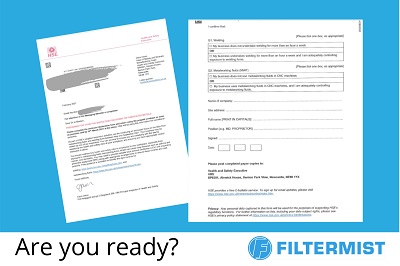UPDATE: A recording of the SHEP metalworking and welding fume webinar, which took place on 9th March and included speakers from the HSE advising on their enforcement expectations, can be accessed by visiting the SHEP website: https://shepuk.co.uk/whats-on/
The Health and Safety Executive’s (HSE) current Manufacturing Sector Plan includes an inspection programme which will run from May to September this year, targeting fabricated metal businesses across GB to ensure duty holders understand the risks posed by welding fumes and metalworking fluids, plan their work and have adequate control measures in place to protect workers’ health.

Letters were issued last month to companies across the UK, including Filtermist, with an accompanying form asking recipients to advise if they undertake welding for more than one hour per week, and if so, do they have adequate controls in place? The form also asks if they use metalworking fluids (MWFs) and if the answer is yes, is the company adequately controlling exposure to MWFs?
Employers have a legal responsibility under COSHH (Control of Substances Hazardous to Health) Regulations 2002 to protect employees from exposure to any substance considered hazardous to health. A hierarchy of controls should be used to identify the most effective control measure for each circumstance, but the HSE generally recommends using Local Exhaust Ventilation (LEV) on all CNC machine tools as the most effective way of controlling contaminated air at source.
Filtermist Systems offers a wide range of products and services designed to ensure the air in fabricated metal premises is clean and safe to breathe, and compliant with COSHH regulations. These include:
A wide-ranging communications campaign from the HSE about the forthcoming inspection programme which included alerting SMEs via SHEP, a collaboration between industry and the HSE, has been rolled out to give companies an opportunity to assess their current controls in the run up to the inspections. SHEP is hosting a webinar on this subject next week and the volume of registrations has been incredible, as Lydia Barber, SHEP Secretary and Director of Group Marketing at Filtermist, confirms, “More than 1400 people have registered to attend the metalworking fluids and welding fume webinar on 9th March which includes speakers from the HSE and the UKLA. This demonstrates both how important this subject is, and how much people value access to accurate information.
“The results of the January-March 2020 HSE metal fabricating sites inspection programme showed that only 38% of the premises visited that used MWFs had LEV systems fitted to the CNC machines.
“There is no excuse for exposing people to hazardous airborne particles, but our team still visits companies that could be doing more to protect their staff. Filtermist has been working in this field for more than 50 years now, and any initiatives that aim to reduce contaminants in workplace air are welcome as far as we’re concerned.”
For companies that have installed LEV systems on their machine tools, COSHH regulations require thorough examination and testing (TExT) at least once every 14 months by a competent person. Some applications require more frequent testing – these include processes in which blasting is carried out in or incidental to the cleaning of metal castings in connection with their manufacture which require testing once a month, and processes giving off dust or fume in which non-ferrous metal castings are produced which require TExTs once every 6 months. Full details can be found in HSE publication HSG258 - Controlling airborne contaminants at work A guide to local exhaust ventilation (LEV).
The recently published HSE Health and Safety at Work, summary statistics for Great Britain 2020 states that there are still approximately 12,000 deaths from lung disease every year which are attributed to past exposures at work. In the manufacturing industry, significant causes of work-related respiratory disease are exposure to MWFs and welding fume – mild steel welding fume was reclassified as a carcinogen in February 2019, and airborne MWF particles can cause a range of illnesses including Occupational Hypersensitivity Pneumonitis (also known as allergic extrinsic alveolitis) and Occupational Asthma.
The HSE has published a number of COSHH essentials sheets for machining with metalworking fluids which can all be accessed on the HSE website, https://www.hse.gov.uk/metalworking/ecoshh.htm. There are also COSHH essentials sheets for welding fume that can be accessed here.
Contact our team now by calling 01952 290500 or by emailing sales@filtermist.com to discuss how we can help you prepare for a possible visit from the HSE.